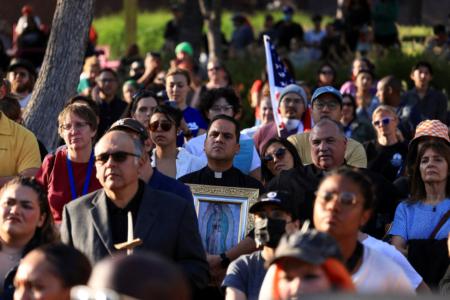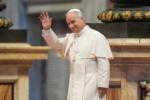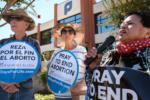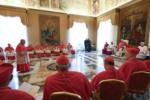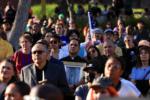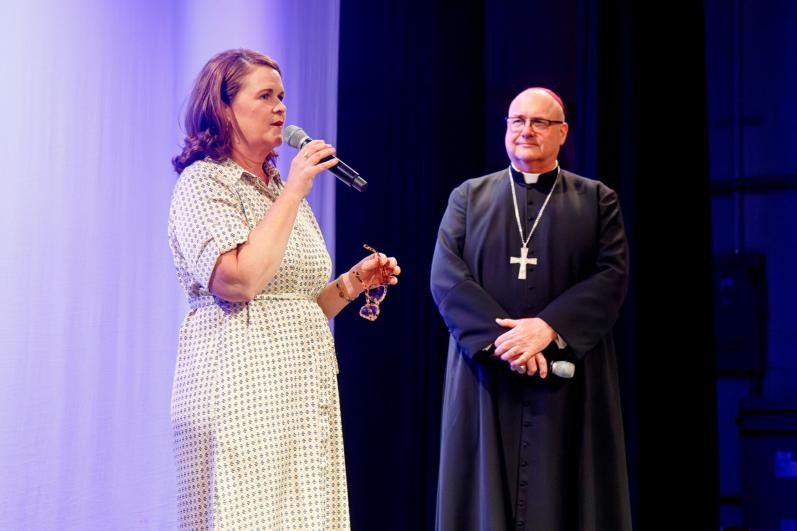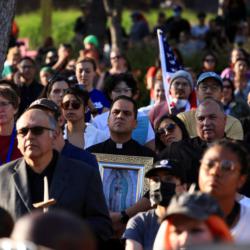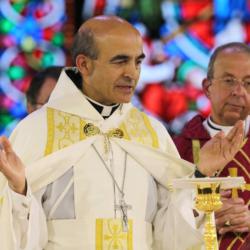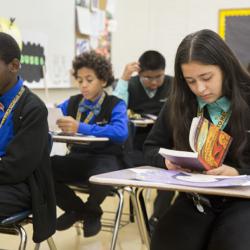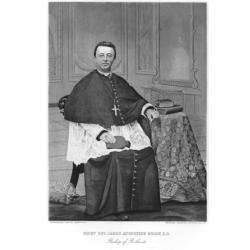Archbishop, superintendent lay out vision for Catholic education at forum
WESTWOOD -- Archbishop Richard G. Henning and Archdiocese of Boston Superintendent of Catholic Schools Eileen McLaughlin laid out a vision for the future of the archdiocese's Catholic schools at "I Believe in Catholic Education," a forum held at Xaverian Brothers High School in Westwood on June 3. Officials from the Catholic Schools Office, as well as officials and pastors from individual schools in the archdiocese, attended.
The forum took place on the one-year anniversary of McLaughlin's first day as superintendent. In her first months, she was frequently asked what she felt were the biggest challenges facing Catholic schools. She pointed to the difficulty of school leaders' work.
"School leadership can be isolating," she said. "Isolation can be disorienting. Schools are called upon to do all things. We are to improve test scores, close the achievement gap, provide breakfast and lunch and after-school activities. We're called to respond to the mental health crisis. We're called to plan for and respond to the arrival of artificial intelligence. We're called to speak to the crisis of immigration."
She said the work is not easy, but it's worth doing.
"What I know for my own lived faith is, what I know that my parents taught me, is that Christ is laboring with us," she said. "That might not be the desired response when we're working to balance our budget, hire teachers, or meet enrollment goals, but it's nonetheless true, and it's the thing that has sustained me in the most challenging of times."
To remedy isolation, she encouraged school leaders to "remember who we are" and "rely on the pillars of that identity."
"We are called to create meaningful learning experiences for all faculty so that teachers might create engaging and rigorous learning experiences for their students," she said. "School leaders are spiritual leaders who are called to engage their faculty in their faith formation so that those teachers might create faith communities in their classrooms."
She announced that the Catholic Schools Office will continue its longstanding partnership with the Lynch Leadership Academy at Boston College. McLaughlin herself participated in the program, which offers training for school leaders. CSO will also be partnering with the Villanova University School of Business starting this year.
"Nearly a dozen Catholic school leaders are participating in a unique program designed to enhance management skills and deepen the spirit of leadership," she said of the Villanova partnership, adding, "It provides principals and business managers with high-quality training and better skills needed to successfully lead Catholic schools."
This summer, CSO will launch the McNeice Academy for Excellence in Catholic Education, sponsored by the McNeice Foundation. The weeklong program will provide onboarding for new teachers, showing them "the values of academics, faith formation, and management." New teachers will learn about NWEA MAP testing, and how data collected from the tests is used to tailor instruction to students' needs. They will also learn how to collaborate with parents, pastors, and principals.
"Most importantly, these teachers will be grounded in what is particular to our educational institutions," McLaughlin said. "We are communities of faith. We are the body of Christ."
Archbishop Henning said that collaboration with parents is what makes Catholic schools special, and parents' first priority is that students are safe in school.
"I can't imagine what it's like for parents these days, in the world we live in, to send their children off to school after reading the news," he said. "That's an exercise in trust."
While the archbishop acknowledged "we've got to raise some money" for schools to purchase upgraded security systems, he said he doesn't just want students to be physically safe, but "safe from poisonous ideologies and politics, safe from all that division out there in the world, morally safe, emotionally safe."
He said that parents want their kids to succeed academically, but they also want their children to "become young men and women of wisdom and moralism, of emotional intelligence, of compassion, of commitment to others as well as to better themselves."
Centering schools' Catholic identity is first on his list of priorities.
"When it comes to teaching, I think it's important for us to be schools where we proclaim the truth, that there is truth in a world that is often too relativistic," he said. "We say, no, there is a God. There is a truth."
He said he will work with the CSO to ensure that schools' religious curricula "particularly respects and improves the fullness of the Catholic catechism." He wants to know how religion teachers, especially at the high school level, are passing on the faith. He plans to meet those teachers and hear from them about their work. He said that all subjects, not just religion, should proclaim the faith.
"We have a wealth of tradition of learning, not only in theology, but in science, in history and literature and art in every possible way," he said.
In particular, he said that art should be promoted within the schools.
"I hope the children see beauty on a daily basis, and that beauty expresses to them the call of God, the presence of God in all of this," he said.
He said he was frustrated that some of the language used by the church has become politicized, especially in regard to diversity, equity, and inclusion (DEI). He pointed to Providence College's guiding document on diversity issues, "The Beloved Community," based on the work of Martin Luther King Jr.
"I think it's a model of a theological reflection that draws upon the Scriptures, Catholic teaching about the dignity of every human being, and then tries to express how we are going to live that here in our community at Providence College," the archbishop said. "That is the kind of exercise that I would hope and pray for in each and every one of our Catholic school communities, and I will be eager to have conversations like that with you and to see to it that the Catholic Schools Office and I help you in that kind of discernment."
He told Catholic school teachers to look to the church's teaching for guidance and wisdom.
"We want our young people to be holy, not in the sense of pious or the characters you see on television, but that sense of wholeness, that sense of focus and devotion set apart for the work of God," he said.
Finally, he thanked Catholic school officials for their sacrifices.
"I love the Catholic schools of this great Archdiocese of Boston, and I love you for the work that you do," he said.
Massachusetts General Hospital Midwifery Director Melissa Nelson delivered remarks entitled "The Witness of an Alumna." She attended St. Mary of the Hills School and Fontbonne Academy, both in Milton, before going on to undergraduate studies at the College of the Holy Cross and nursing degrees from University of Pennsylvania School of Nursing.
The daughter of Haitian immigrants, she said her parents hoped that she would not only be an educated professional with a successful career, but a woman "with strong morals and character."
"I am truly my ancestors' wildest dreams," she said.
She said she began her Catholic education at St. Mary School in Quincy, then moved to the more diverse St. Mary of the Hills.
"As a young Haitian girl, it was powerful and affirming to see classmates who looked like me," she said. "That environment helped me feel comfortable in my own skin. It boosted my confidence and shaped my self esteem in those formative years."
At Fontbonne, she felt a responsibility to help others and learned how to think critically and study Scripture more closely. Participating in after-school activities made her more confident, better organized, and a better communicator.
"Beyond academics, Fontbonne gave me something even more lasting, the sacred power of sisterhood," she said. "It was a bond that lifted me up and empowered me in ways I'll never forget. And most importantly, Fontbonne taught me that as a woman, my voice is powerful and I can achieve anything I set my mind to."
Her passion for women's health comes from the values she learned in Catholic schools.
"I am a product of Catholic education, and I want you to know it was educators like you who believed in me, who saw my potential, who reminded me that success was within reach and that who we are is the very best part of us," she said.
After Nelson's remarks, Catholic Charities Boston President and CEO Kelley Tuthill, who served as the forum's emcee, asked Archbishop Henning and McLaughlin questions that had been submitted by attendees of the forum.
The first question was about "the sustainability of the schools" and how to unite everyone under a single vision. McLaughlin said that it is important for the CSO to emphasize community and diverse perspectives, and that school leaders should be held accountable for their actions even if that feels uncomfortable.
"One of the things I would like to see us initiate here in the archdiocese would be to provide some kind of training for those who serve on boards," Archbishop Henning said.
The second question was how Catholic education can remain financially viable for families and keep enrollment at a sustainable level. Archbishop Henning said that he is seeing increased Mass attendance in parishes, an opportunity for the archdiocese to evangelize.
"I think this is a moment that summons us, really, to bring everything we can to the table," he said. "And I would like that Catholic moment to be a Catholic schools moment."
He has seen a modest increase in enrollment and believes that the reason it isn't higher is because of how expensive tuition can be.
"I don't have an easy solution to that, but I would certainly like to work as hard as I can with all of you to find ways to draw ever more families into this gift," he said.
McLaughlin said that the problem can be addressed with collaboration between the CSO and school boards.
The final question was how Catholic schools can have competitive salaries for teachers who are being wooed by public, private, and charter schools. McLaughlin said that Catholic schools need to create a welcoming environment for teachers.
"We are sometimes governed by fear, led by fear that there won't be enough, a sort of scarcity mentality, and when we lead from that place, it presents challenges," she said.
She added that teachers should be encouraged "to be the person that God created them to be." She herself didn't expect to spend her whole life in Catholic education, but she stayed because of the supportive community.
Archbishop Henning said that the salary gap between Catholic and public school teachers has increased in recent decades, but that Catholic school salaries don't necessarily have to match public schools because Catholic schools "have a whole lot of other values" that attract teachers. Then again, he noted, teachers have to be able to feed their families.
"I think there's a justice question there that we have to face," he said. "So I think again, that's work to be done, but coming from a place of mission and passion and generosity."
The evening also featured performances of "You Are Holy (Prince of Peace)" by the St. Agatha School Chorus of Milton, and "Lift Every Voice and Sing" by the St. John Paul II Catholic Academy Lower Mills Campus Choir of Dorchester.
